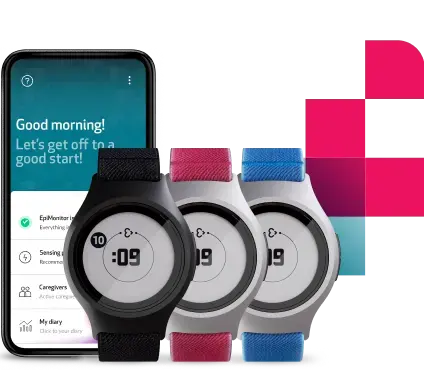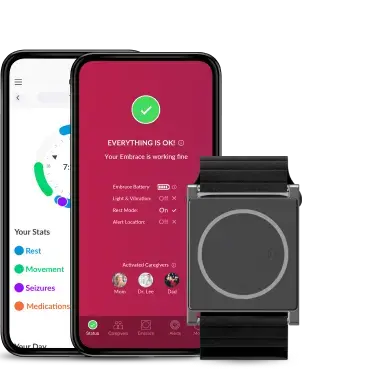Exploring new frontiers to predict respiratory infections
The peak of flu season is upon us, and each year the wave seems to grow more intense. The first sign of a sore throat or stuffiness may signal that it’s already too late to ward off the virus. What if you could spare yourself the coughing, chills, and fatigue, by receiving an alert on your phone before symptoms even start to develop?
Since the outset, we’ve been focused on developing breakthrough technology to improve and possibly save lives. The majority of our work has been on epilepsy, seeking to understand the problems and struggles faced by people with epilepsy, and provide wearable health solutions that ease the burden and help them live more independently. We’re now excited to expand our research in health sensor technology to assist other areas of need.
Broadening the reach of our novel technology
We've partnered with the U.S. government through DRIVe, a division of the The U.S. Department of Health and Human Services, that brings together the best ideas from medical and scientific communities, with government investment, to transform health security. With their collaboration, we’ll start working on a research project to develop a new smart watch to alert users when they’re developing a serious lung infection, even before any symptoms appear.
To do this, we will investigate the use of the same advanced machine learning technology housed in our FDA-cleared Embrace2, to monitor physiological signals that suggest the person is getting ill, and subsequently alert users and their caregivers.
Our Chief Scientist and Co-founder, Rosalind Picard, describes the potential impact of the project, “Imagine if your future smart watch could tell you your body is fighting sickness before you have any obvious symptoms— and that if you go to sleep two hours early tonight and drink a special beverage you would have 70% less chance of coming down with the flu tomorrow — how would your life be improved? Multiply that by 49M people in the U.S. who had influenza in 2018 — how would our world be improved?”
The global burden of respiratory infections
A runny nose, hacking cough, and red watery eyes are annoying effects of the flu most of us are familiar with. They strike on average 5 to 20 percent of the US population each year. Everyone has their own remedy, and it's generally no cause for alarm. However, combatting the virus can be much more severe for certain populations, such as young children, pregnant women, and especially the elderly. Serious flu-related complications can lead to hospitalization, and sometimes even death. The CDC estimates that the 2017-2018 influenza season resulted in 959,000 hospitalizations and 79,400 deaths. Older adults accounted for 70% of the death and 90% of the deaths.
Grand-scale impact
By being able to detect respiratory infections, patients can receive the medicine they need to keep them healthier, and this in turn could stop the infection from traveling and spreading to others. We believe that innovative medical technology should be widely available to the general public, which is why are dedicated to building smart wearable solutions that are in sync with your health. While our focus on helping people with epilepsy will continue to be at the forefront of what we do, we're looking forward to unlock the power of our technology to address a broader range of conditions and illnesses.
Words worth reading
We do not guarantee that EpiMonitor will detect every single seizure and deliver alerts accordingly. It is not meant to substitute your current seizure monitoring practices, but rather to serve as a supplement in expediting first-response time.



